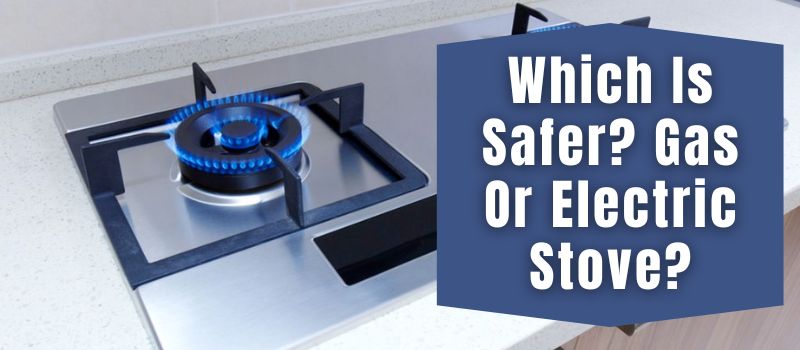When it comes to choosing a stove for your home, safety and efficiency are top priorities. This article will provide an in-depth comparison between gas and electric stoves, discussing the pros and cons of each to help you make an informed decision.
As experts in the field, we’ve thoroughly researched and compiled well-established scientific consensus to ensure the accuracy and reliability of the information provided.
Which Is Safer? Gas or Electric Stove? Expert Guide
When considering safety, both gas and electric stoves should be used with caution due to the risk of burns and fires. However, electric stoves are generally considered slightly safer. Gas stoves possess open flames that can potentially spread if flammable objects like towels or oven mitts come into close proximity.
The Benefits of Gas Stoves
1. Faster Cooking Times
Gas stoves are known for their fast heating capabilities. They provide instant heat and precise temperature control, allowing you to cook dishes more efficiently. This is especially useful for recipes that require a quick sear or high-heat cooking methods.
2. Lower Long-Term Costs
Natural gas is generally cheaper than electricity, making gas stoves more cost-effective in the long run. This can be an important factor to consider when weighing the pros and cons of each stove type.
3. Better Heat Distribution
Gas stoves typically offer better heat distribution than electric stoves. The flames spread evenly across the bottom of your cookware, ensuring that your food cooks uniformly. This can lead to more consistent results and better-tasting dishes.
The Drawbacks of Gas Stoves
1. Potential Gas Leaks
One concern with gas stoves is the possibility of gas leaks. While these incidents are relatively rare, they can be dangerous if not promptly addressed. It’s essential to install a gas leak detector and ensure proper ventilation in your kitchen to mitigate this risk.
2. More Difficult to Clean
Gas stoves can be more challenging to clean compared to their electric counterparts. Food spills and debris can collect in the burner grates, requiring more effort to maintain.
The Benefits of Electric Stoves
1. Easy Installation and Maintenance
Electric stoves are typically easier to install and maintain than gas stoves. They don’t require a gas line, making them a more convenient option for some households. Additionally, they have fewer parts that can wear out or require replacement, which can save you time and money.
2. Enhanced Safety Features
Many modern electric stoves come with built-in safety features, such as automatic shutoffs and heat indicators. These features can help prevent accidents in the kitchen and make your cooking experience safer overall.
3. Easy Cleaning
Electric stoves are generally easier to clean than gas stoves. Flat-top electric stoves, in particular, have a smooth surface that can be quickly wiped down after cooking.
The Drawbacks of Electric Stoves
1. Slower Heating and Cooling Times
Electric stoves tend to heat up and cool down more slowly than gas stoves. This can be frustrating for those who need to quickly adjust cooking temperatures or who want to avoid overcooking their food.
2. Higher Long-Term Costs
Electric stoves are often more expensive to operate in the long run due to the higher cost of electricity compared to natural gas. This is an important factor to consider when deciding between the two types of stoves.
Safety Comparisons: Gas vs Electric Stoves
Both gas and electric stoves have their own unique safety concerns, but with proper precautions, both can be used safely in your home.
Gas Stoves
- Install a gas leak detector to alert you to any potential leaks
- Ensure proper ventilation in your kitchen to mitigate any risks associated with gas leaks
- Keep flammable materials away from open flames
Electric Stoves
- Be cautious of hot surfaces, as electric stoves may not always show visible signs of heat
- Utilize built-in safety features, such as automatic shutoffs and heat indicators
- Ensure your electrical system is up to code and can handle the power demands of your electric stove
In terms of safety, both gas and electric stoves can be used securely when following appropriate precautions. However, electric stoves may be considered slightly safer due to their built-in safety features and the absence of open flames.
Energy Efficiency: Gas vs Electric Stoves
Energy efficiency is an essential consideration for many homeowners when choosing between gas and electric stoves. Here’s a comparison of the two types:
Gas Stoves
- Generally more energy-efficient, as they heat up and cool down quickly
- Natural gas is a more sustainable energy source compared to coal-generated electricity
- Gas stoves provide better heat control, allowing for more efficient cooking
Electric Stoves
- Can be less energy-efficient, as they take longer to heat up and cool down
- The efficiency of electric stoves depends on the source of electricity; renewable energy sources make electric stoves more environmentally friendly
- Induction cooktops, a type of electric stove, are highly energy-efficient and can be a greener option for some households
While gas stoves are generally more energy-efficient, the efficiency of electric stoves can vary depending on the source of electricity. Induction cooktops, in particular, can be an eco-friendly choice for those looking to reduce their environmental impact.
Making the Decision: Gas or Electric Stove?
Ultimately, the choice between a gas and electric stove depends on your personal preferences, cooking habits, and household needs. Here are some key factors to consider when making your decision:
- Safety: While both stove types can be used safely, electric stoves may be considered slightly safer due to their built-in safety features and lack of open flames.
- Energy Efficiency: Gas stoves are generally more energy-efficient, but electric stoves (especially induction cooktops) can be a greener option depending on your electricity source.
- Cost: Gas stoves tend to have lower long-term costs due to cheaper natural gas prices, but electric stoves are usually easier to install and maintain.
- Cooking Preferences: If you prefer precise heat control and faster cooking times, a gas stove may be more suitable. If you prioritize easy cleaning and safety features, an electric stove might be a better fit.
We hope this article has provided you with the information you need to make an informed decision about which stove type is the best fit for your home. By taking into account safety, efficiency, and your personal preferences, you can find the perfect stove that meets your needs while ensuring a secure and enjoyable cooking experience.
Read more:
- How Much Electricity Does an Electric Stove Use Per Month?
- Save Money on Your Electric Stove: Tips and Tricks
- How Many Watts Does an Electric Stove Use?
- Can You Leave an Electric Burner On All Night?
Bora Khay is a skilled expert in the world of kitchen equipment, specialising in hot plates, stoves, and other related appliances. With more than 7 years of experience in the sector, Bora has developed a sharp eye for quality and an in-depth awareness of consumer demands and preferences. Read more.



